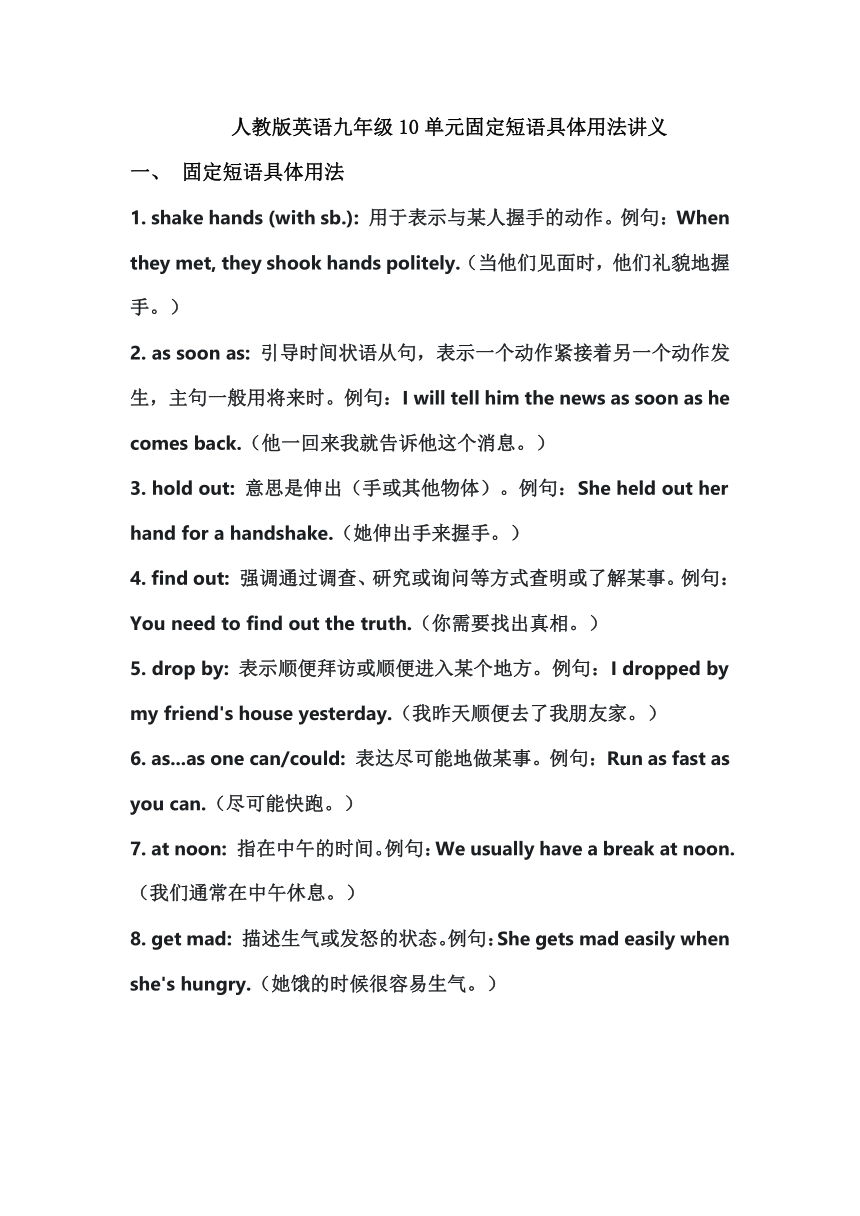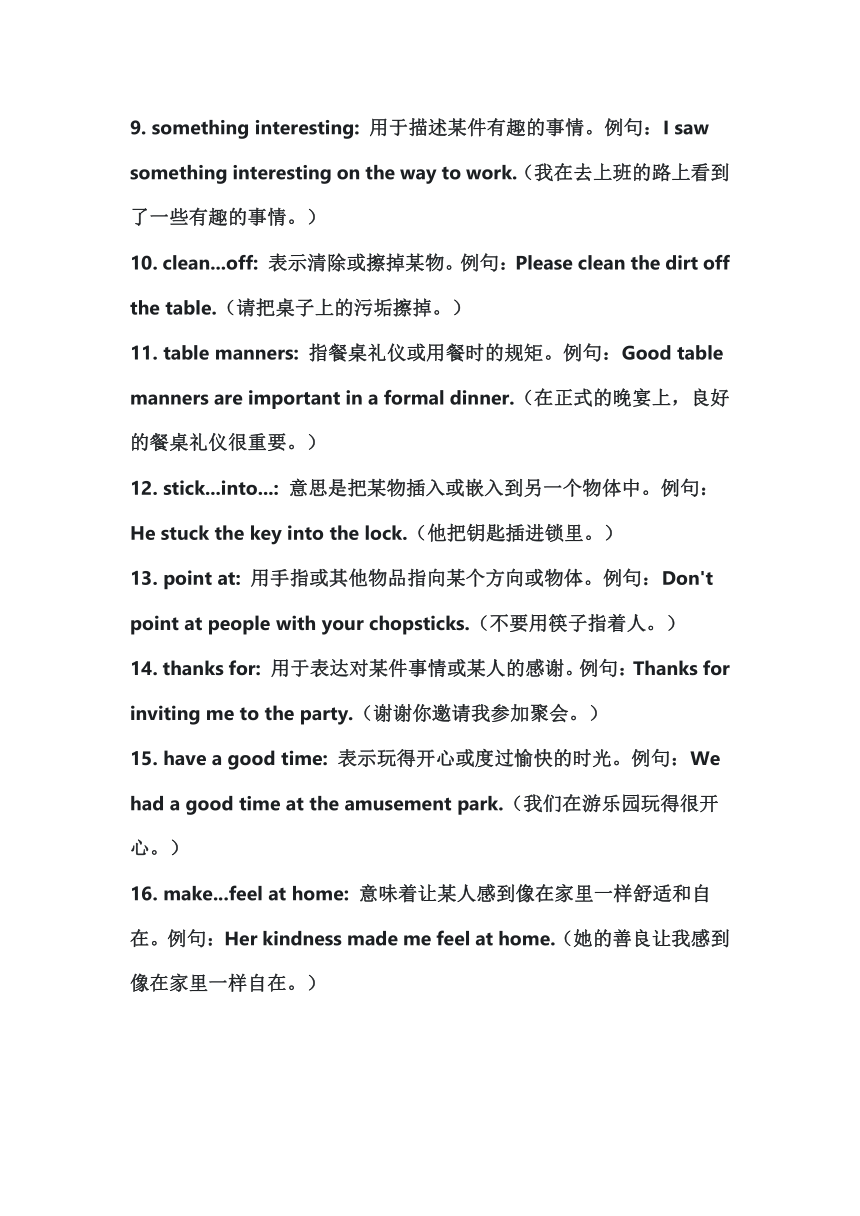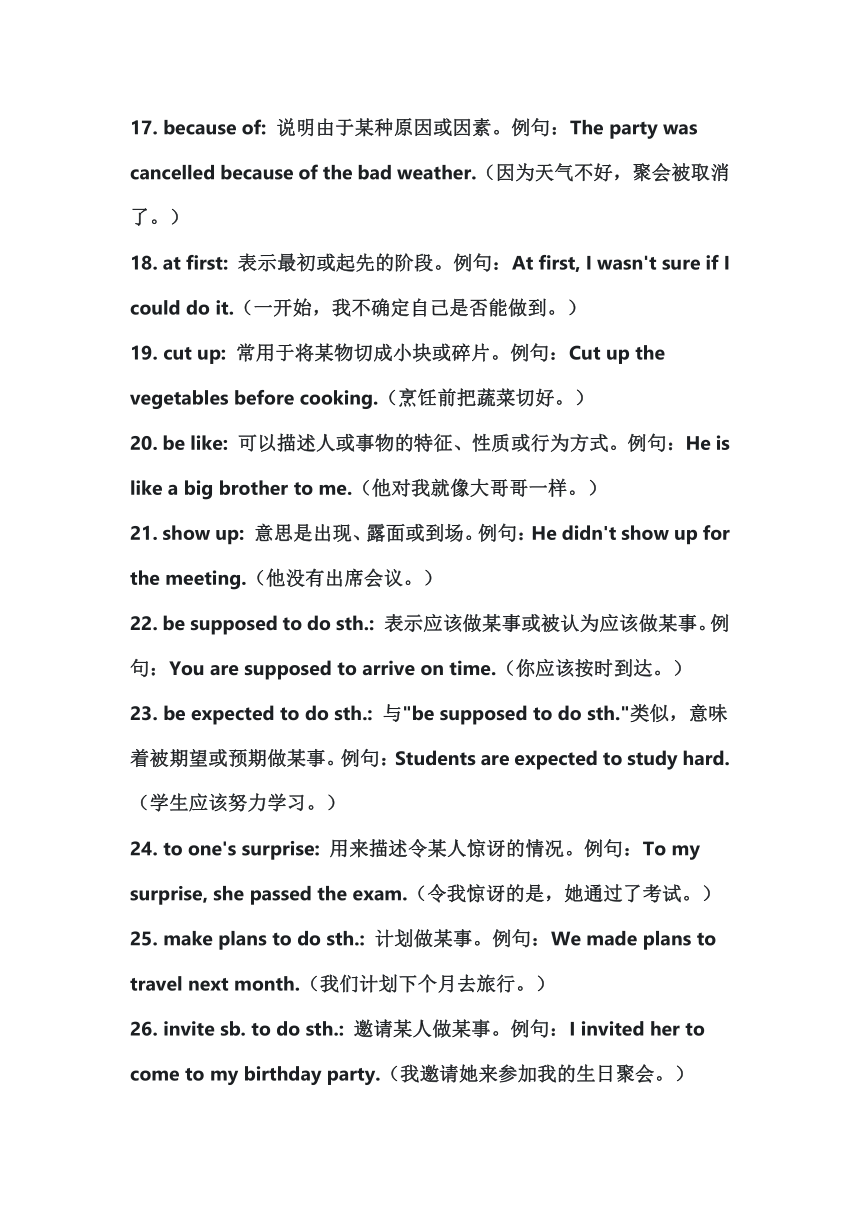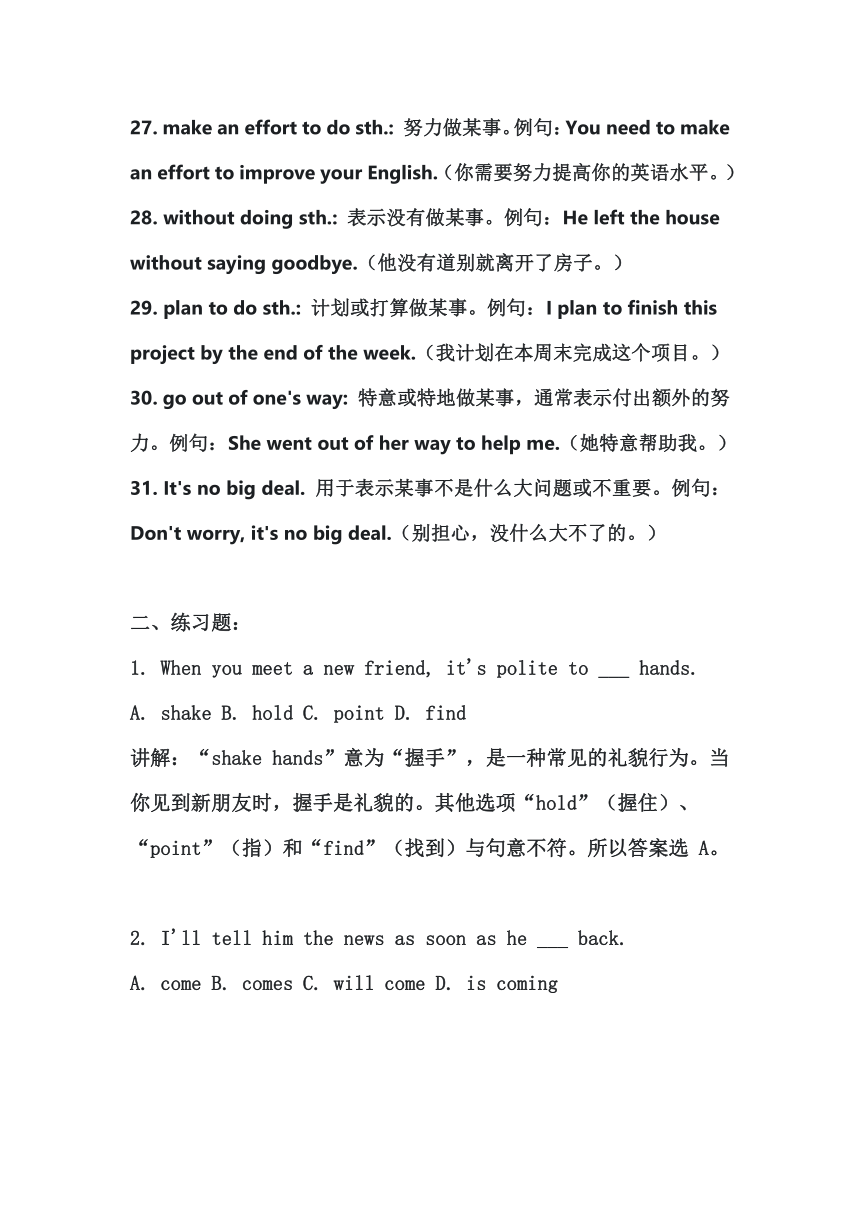Unit 10 You're supposed to shake hands.固定短语具体用法讲义
文档属性
| 名称 | Unit 10 You're supposed to shake hands.固定短语具体用法讲义 |  | |
| 格式 | docx | ||
| 文件大小 | 22.3KB | ||
| 资源类型 | 教案 | ||
| 版本资源 | 人教新目标(Go for it)版 | ||
| 科目 | 英语 | ||
| 更新时间 | 2024-02-08 08:34:42 | ||
图片预览




文档简介
人教版英语九年级10单元固定短语具体用法讲义
固定短语具体用法
1. shake hands (with sb.): 用于表示与某人握手的动作。例句:When they met, they shook hands politely.(当他们见面时,他们礼貌地握手。)
2. as soon as: 引导时间状语从句,表示一个动作紧接着另一个动作发生,主句一般用将来时。例句:I will tell him the news as soon as he comes back.(他一回来我就告诉他这个消息。)
3. hold out: 意思是伸出(手或其他物体)。例句:She held out her hand for a handshake.(她伸出手来握手。)
4. find out: 强调通过调查、研究或询问等方式查明或了解某事。例句:You need to find out the truth.(你需要找出真相。)
5. drop by: 表示顺便拜访或顺便进入某个地方。例句:I dropped by my friend's house yesterday.(我昨天顺便去了我朋友家。)
6. as...as one can/could: 表达尽可能地做某事。例句:Run as fast as you can.(尽可能快跑。)
7. at noon: 指在中午的时间。例句:We usually have a break at noon.(我们通常在中午休息。)
8. get mad: 描述生气或发怒的状态。例句:She gets mad easily when she's hungry.(她饿的时候很容易生气。)
9. something interesting: 用于描述某件有趣的事情。例句:I saw something interesting on the way to work.(我在去上班的路上看到了一些有趣的事情。)
10. clean...off: 表示清除或擦掉某物。例句:Please clean the dirt off the table.(请把桌子上的污垢擦掉。)
11. table manners: 指餐桌礼仪或用餐时的规矩。例句:Good table manners are important in a formal dinner.(在正式的晚宴上,良好的餐桌礼仪很重要。)
12. stick...into...: 意思是把某物插入或嵌入到另一个物体中。例句:He stuck the key into the lock.(他把钥匙插进锁里。)
13. point at: 用手指或其他物品指向某个方向或物体。例句:Don't point at people with your chopsticks.(不要用筷子指着人。)
14. thanks for: 用于表达对某件事情或某人的感谢。例句:Thanks for inviting me to the party.(谢谢你邀请我参加聚会。)
15. have a good time: 表示玩得开心或度过愉快的时光。例句:We had a good time at the amusement park.(我们在游乐园玩得很开心。)
16. make...feel at home: 意味着让某人感到像在家里一样舒适和自在。例句:Her kindness made me feel at home.(她的善良让我感到像在家里一样自在。)
17. because of: 说明由于某种原因或因素。例句:The party was cancelled because of the bad weather.(因为天气不好,聚会被取消了。)
18. at first: 表示最初或起先的阶段。例句:At first, I wasn't sure if I could do it.(一开始,我不确定自己是否能做到。)
19. cut up: 常用于将某物切成小块或碎片。例句:Cut up the vegetables before cooking.(烹饪前把蔬菜切好。)
20. be like: 可以描述人或事物的特征、性质或行为方式。例句:He is like a big brother to me.(他对我就像大哥哥一样。)
21. show up: 意思是出现、露面或到场。例句:He didn't show up for the meeting.(他没有出席会议。)
22. be supposed to do sth.: 表示应该做某事或被认为应该做某事。例句:You are supposed to arrive on time.(你应该按时到达。)
23. be expected to do sth.: 与"be supposed to do sth."类似,意味着被期望或预期做某事。例句:Students are expected to study hard.(学生应该努力学习。)
24. to one's surprise: 用来描述令某人惊讶的情况。例句:To my surprise, she passed the exam.(令我惊讶的是,她通过了考试。)
25. make plans to do sth.: 计划做某事。例句:We made plans to travel next month.(我们计划下个月去旅行。)
26. invite sb. to do sth.: 邀请某人做某事。例句:I invited her to come to my birthday party.(我邀请她来参加我的生日聚会。)
27. make an effort to do sth.: 努力做某事。例句:You need to make an effort to improve your English.(你需要努力提高你的英语水平。)
28. without doing sth.: 表示没有做某事。例句:He left the house without saying goodbye.(他没有道别就离开了房子。)
29. plan to do sth.: 计划或打算做某事。例句:I plan to finish this project by the end of the week.(我计划在本周末完成这个项目。)
30. go out of one's way: 特意或特地做某事,通常表示付出额外的努力。例句:She went out of her way to help me.(她特意帮助我。)
31. It's no big deal. 用于表示某事不是什么大问题或不重要。例句:Don't worry, it's no big deal.(别担心,没什么大不了的。)
二、练习题:
1. When you meet a new friend, it's polite to ___ hands.
A. shake B. hold C. point D. find
讲解:“shake hands”意为“握手”,是一种常见的礼貌行为。当你见到新朋友时,握手是礼貌的。其他选项“hold”(握住)、“point”(指)和“find”(找到)与句意不符。所以答案选 A。
2. I'll tell him the news as soon as he ___ back.
A. come B. comes C. will come D. is coming
讲解:“as soon as”引导时间状语从句,主句用一般将来时,从句用一般现在时。he 是第三人称单数,所以用 comes。这句话的意思是:他一回来我就告诉他这个消息。答案选 B。
3. Please ___ your hand if you have any questions.
A. hold out B. hold on C. hold up D. hold back
讲解:“hold out”意为“伸出”,“hold on”意为“坚持”,“hold up”意为“举起”,“hold back”意为“抑制”。根据句意,如果你有任何问题,请伸出你的手。所以答案选 A。
4. We need to ___ more information about the project.
A. find out B. look for C. discover D. invent
讲解:“find out”强调通过调查、研究等方式找出事实真相;“look for”强调寻找的过程;“discover”强调发现以前不知道的事物;“invent”强调创造出新的东西。根据句意,我们需要查明更多关于这个项目的信息。所以答案选 A。
5. I ___ by my friend's house on my way home.
A. dropped B. dropped in C. dropped by D. dropped off
讲解:“drop by”指顺便访问,符合句意“在回家的路上,我顺便去了朋友家”。其他选项“drop”(掉下)、“drop in”(顺便拜访)和“drop off”(让……下车)不符合句意。所以答案选 C。
6. You should eat ___ you can to stay healthy.
A. as much as B. as soon as C. as well as D. as good as
讲解:“as...as one can/could”表示“尽可能……”。“as much as”表示尽可能多,“as soon as”表示一……就……,“as well as”表示也、和……一样好,“as good as”表示和……一样好。根据句意,你应该尽可能多吃以保持健康。所以答案选 A。
7. We usually have lunch ___ noon.
A. in B. on C. at D. for
讲解:“at noon”表示在中午,是固定搭配。所以答案选 C。
8. My teacher got mad ___ my grades.
A. with B. at C. in D. for
讲解:“get mad at”表示对某人生气、发怒,“grades”指成绩。所以答案选 B。
9. I found ___ interesting to learn a new language.
A. it B. that C. this D. one
讲解:“find it + adj. + to do sth.”是一个固定句型,其中“it”是形式宾语,真正的宾语是后面的不定式短语。所以答案选 A。
10. Please ___ the mud off your shoes before coming in.
A. clean B. clear C. wipe D. brush
讲解:“clean...off”表示把……擦掉,“mud”(泥土)需要擦掉。其他选项“clear”(清除)、“wipe”(擦)和“brush”(刷)虽然也有清除的意思,但不如“clean...off”常用。所以答案选 A。
11. Good ___ are important when you are having a meal with others.
A. manners B. hobbies C. ideas D. interests
讲解:“manners”指礼仪、礼貌,“table manners”意为餐桌礼仪。根据句意,当你和别人一起吃饭时,良好的餐桌礼仪是很重要的。所以答案选 A。
12. He ___ a stick into the ground.
A. put B. placed C. stuck D. set
讲解:“stick...into...”表示把……插入……,是固定搭配。所以答案选 C。
13. Don't ___ at me like that.
A. look B. see C. watch D. point
讲解:“point at”表示指着,根据句意,不要那样指着我。所以答案选 D。
14. Thanks for ___ me to your party.
A. invite B. inviting C. invitation D. invites
讲解:“thanks for”后面接名词或动名词,表示感谢的原因。“invite”的动名词形式是“inviting”。所以答案选 B。
15. We had a great time at the party. ___, it rained heavily.
A. But B. However C. Instead D. Otherwise
讲解:前后句之间是转折关系,“However”可以用于句首,“but”通常用于句中。“Instead”表示相反,“otherwise”表示否则。根据句意,我们在聚会上玩得很开心,然而,雨下得很大。所以答案选 B。
固定短语具体用法
1. shake hands (with sb.): 用于表示与某人握手的动作。例句:When they met, they shook hands politely.(当他们见面时,他们礼貌地握手。)
2. as soon as: 引导时间状语从句,表示一个动作紧接着另一个动作发生,主句一般用将来时。例句:I will tell him the news as soon as he comes back.(他一回来我就告诉他这个消息。)
3. hold out: 意思是伸出(手或其他物体)。例句:She held out her hand for a handshake.(她伸出手来握手。)
4. find out: 强调通过调查、研究或询问等方式查明或了解某事。例句:You need to find out the truth.(你需要找出真相。)
5. drop by: 表示顺便拜访或顺便进入某个地方。例句:I dropped by my friend's house yesterday.(我昨天顺便去了我朋友家。)
6. as...as one can/could: 表达尽可能地做某事。例句:Run as fast as you can.(尽可能快跑。)
7. at noon: 指在中午的时间。例句:We usually have a break at noon.(我们通常在中午休息。)
8. get mad: 描述生气或发怒的状态。例句:She gets mad easily when she's hungry.(她饿的时候很容易生气。)
9. something interesting: 用于描述某件有趣的事情。例句:I saw something interesting on the way to work.(我在去上班的路上看到了一些有趣的事情。)
10. clean...off: 表示清除或擦掉某物。例句:Please clean the dirt off the table.(请把桌子上的污垢擦掉。)
11. table manners: 指餐桌礼仪或用餐时的规矩。例句:Good table manners are important in a formal dinner.(在正式的晚宴上,良好的餐桌礼仪很重要。)
12. stick...into...: 意思是把某物插入或嵌入到另一个物体中。例句:He stuck the key into the lock.(他把钥匙插进锁里。)
13. point at: 用手指或其他物品指向某个方向或物体。例句:Don't point at people with your chopsticks.(不要用筷子指着人。)
14. thanks for: 用于表达对某件事情或某人的感谢。例句:Thanks for inviting me to the party.(谢谢你邀请我参加聚会。)
15. have a good time: 表示玩得开心或度过愉快的时光。例句:We had a good time at the amusement park.(我们在游乐园玩得很开心。)
16. make...feel at home: 意味着让某人感到像在家里一样舒适和自在。例句:Her kindness made me feel at home.(她的善良让我感到像在家里一样自在。)
17. because of: 说明由于某种原因或因素。例句:The party was cancelled because of the bad weather.(因为天气不好,聚会被取消了。)
18. at first: 表示最初或起先的阶段。例句:At first, I wasn't sure if I could do it.(一开始,我不确定自己是否能做到。)
19. cut up: 常用于将某物切成小块或碎片。例句:Cut up the vegetables before cooking.(烹饪前把蔬菜切好。)
20. be like: 可以描述人或事物的特征、性质或行为方式。例句:He is like a big brother to me.(他对我就像大哥哥一样。)
21. show up: 意思是出现、露面或到场。例句:He didn't show up for the meeting.(他没有出席会议。)
22. be supposed to do sth.: 表示应该做某事或被认为应该做某事。例句:You are supposed to arrive on time.(你应该按时到达。)
23. be expected to do sth.: 与"be supposed to do sth."类似,意味着被期望或预期做某事。例句:Students are expected to study hard.(学生应该努力学习。)
24. to one's surprise: 用来描述令某人惊讶的情况。例句:To my surprise, she passed the exam.(令我惊讶的是,她通过了考试。)
25. make plans to do sth.: 计划做某事。例句:We made plans to travel next month.(我们计划下个月去旅行。)
26. invite sb. to do sth.: 邀请某人做某事。例句:I invited her to come to my birthday party.(我邀请她来参加我的生日聚会。)
27. make an effort to do sth.: 努力做某事。例句:You need to make an effort to improve your English.(你需要努力提高你的英语水平。)
28. without doing sth.: 表示没有做某事。例句:He left the house without saying goodbye.(他没有道别就离开了房子。)
29. plan to do sth.: 计划或打算做某事。例句:I plan to finish this project by the end of the week.(我计划在本周末完成这个项目。)
30. go out of one's way: 特意或特地做某事,通常表示付出额外的努力。例句:She went out of her way to help me.(她特意帮助我。)
31. It's no big deal. 用于表示某事不是什么大问题或不重要。例句:Don't worry, it's no big deal.(别担心,没什么大不了的。)
二、练习题:
1. When you meet a new friend, it's polite to ___ hands.
A. shake B. hold C. point D. find
讲解:“shake hands”意为“握手”,是一种常见的礼貌行为。当你见到新朋友时,握手是礼貌的。其他选项“hold”(握住)、“point”(指)和“find”(找到)与句意不符。所以答案选 A。
2. I'll tell him the news as soon as he ___ back.
A. come B. comes C. will come D. is coming
讲解:“as soon as”引导时间状语从句,主句用一般将来时,从句用一般现在时。he 是第三人称单数,所以用 comes。这句话的意思是:他一回来我就告诉他这个消息。答案选 B。
3. Please ___ your hand if you have any questions.
A. hold out B. hold on C. hold up D. hold back
讲解:“hold out”意为“伸出”,“hold on”意为“坚持”,“hold up”意为“举起”,“hold back”意为“抑制”。根据句意,如果你有任何问题,请伸出你的手。所以答案选 A。
4. We need to ___ more information about the project.
A. find out B. look for C. discover D. invent
讲解:“find out”强调通过调查、研究等方式找出事实真相;“look for”强调寻找的过程;“discover”强调发现以前不知道的事物;“invent”强调创造出新的东西。根据句意,我们需要查明更多关于这个项目的信息。所以答案选 A。
5. I ___ by my friend's house on my way home.
A. dropped B. dropped in C. dropped by D. dropped off
讲解:“drop by”指顺便访问,符合句意“在回家的路上,我顺便去了朋友家”。其他选项“drop”(掉下)、“drop in”(顺便拜访)和“drop off”(让……下车)不符合句意。所以答案选 C。
6. You should eat ___ you can to stay healthy.
A. as much as B. as soon as C. as well as D. as good as
讲解:“as...as one can/could”表示“尽可能……”。“as much as”表示尽可能多,“as soon as”表示一……就……,“as well as”表示也、和……一样好,“as good as”表示和……一样好。根据句意,你应该尽可能多吃以保持健康。所以答案选 A。
7. We usually have lunch ___ noon.
A. in B. on C. at D. for
讲解:“at noon”表示在中午,是固定搭配。所以答案选 C。
8. My teacher got mad ___ my grades.
A. with B. at C. in D. for
讲解:“get mad at”表示对某人生气、发怒,“grades”指成绩。所以答案选 B。
9. I found ___ interesting to learn a new language.
A. it B. that C. this D. one
讲解:“find it + adj. + to do sth.”是一个固定句型,其中“it”是形式宾语,真正的宾语是后面的不定式短语。所以答案选 A。
10. Please ___ the mud off your shoes before coming in.
A. clean B. clear C. wipe D. brush
讲解:“clean...off”表示把……擦掉,“mud”(泥土)需要擦掉。其他选项“clear”(清除)、“wipe”(擦)和“brush”(刷)虽然也有清除的意思,但不如“clean...off”常用。所以答案选 A。
11. Good ___ are important when you are having a meal with others.
A. manners B. hobbies C. ideas D. interests
讲解:“manners”指礼仪、礼貌,“table manners”意为餐桌礼仪。根据句意,当你和别人一起吃饭时,良好的餐桌礼仪是很重要的。所以答案选 A。
12. He ___ a stick into the ground.
A. put B. placed C. stuck D. set
讲解:“stick...into...”表示把……插入……,是固定搭配。所以答案选 C。
13. Don't ___ at me like that.
A. look B. see C. watch D. point
讲解:“point at”表示指着,根据句意,不要那样指着我。所以答案选 D。
14. Thanks for ___ me to your party.
A. invite B. inviting C. invitation D. invites
讲解:“thanks for”后面接名词或动名词,表示感谢的原因。“invite”的动名词形式是“inviting”。所以答案选 B。
15. We had a great time at the party. ___, it rained heavily.
A. But B. However C. Instead D. Otherwise
讲解:前后句之间是转折关系,“However”可以用于句首,“but”通常用于句中。“Instead”表示相反,“otherwise”表示否则。根据句意,我们在聚会上玩得很开心,然而,雨下得很大。所以答案选 B。
同课章节目录
- Unit 1 How can we become good learners.
- Section A
- Section B
- Unit 2 I think that mooncakes are delicious!
- Section A
- Section B
- Unit 3 Could you please tell me where the restroom
- Section A
- Section B
- Unit 4 I used to be afraid of the dark.
- Section A
- Section B
- Unit 5 What are the shirts made of?
- Section A
- Section B
- Review of Units 1-5
- Unit 6 When was it invented?
- Section A
- Section B
- Unit 7 Teenagers should be allowed to choose their
- Section A
- Section B
- Unit 8 It must belong to Carla.
- Section A
- Section B
- Unit 9 I like music that I can dance to.
- Section A
- Section B
- Unit 10 You're supposed to shake hands.
- Section A
- Section B
- Review of Units 6-10
- Unit 11 Sad movies make me cry.
- Section A
- Section B
- Unit 12 Life is full of the unexpected
- Section A
- Section B
- Unit 13 We're trying to save the earth!
- Section A
- Section B
- Unit 14 I remember meeting all of you in Grade 7.
- Section A
- Section B
- Review of Units 11-14
